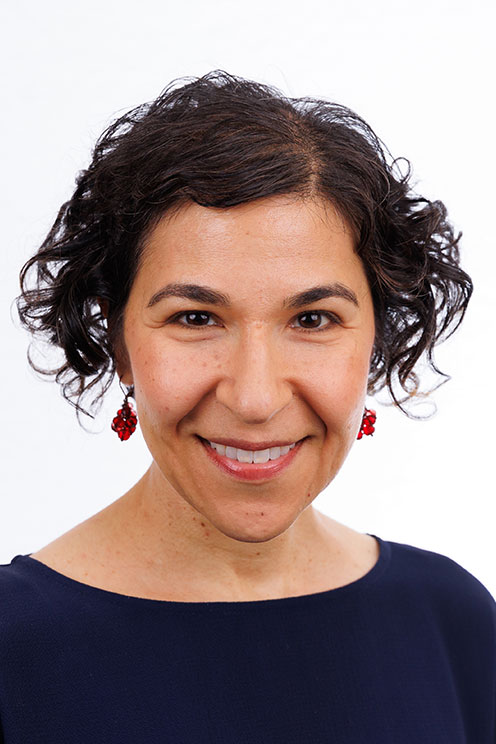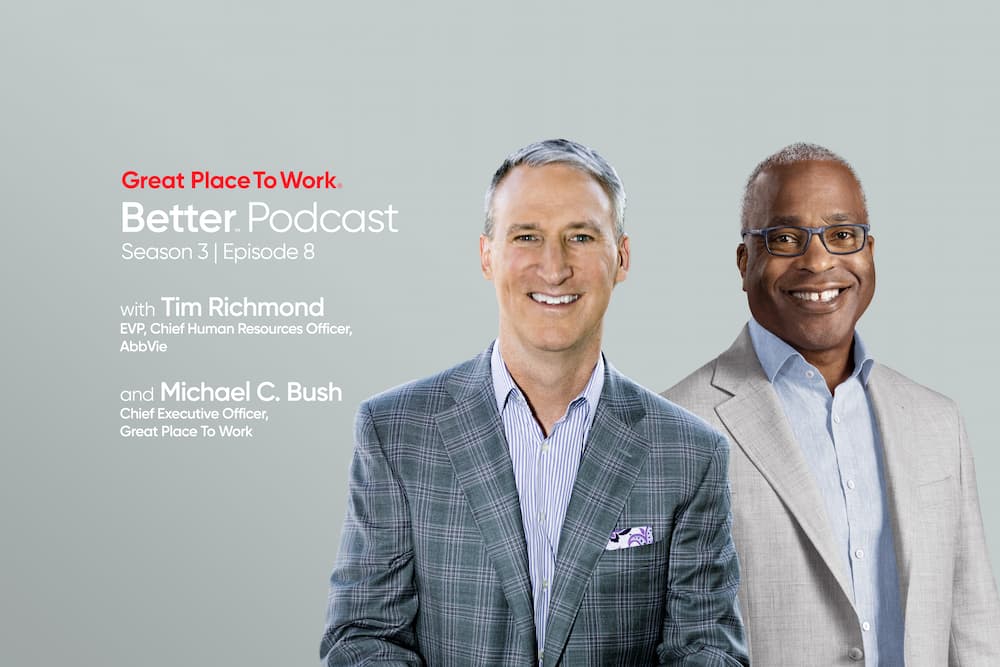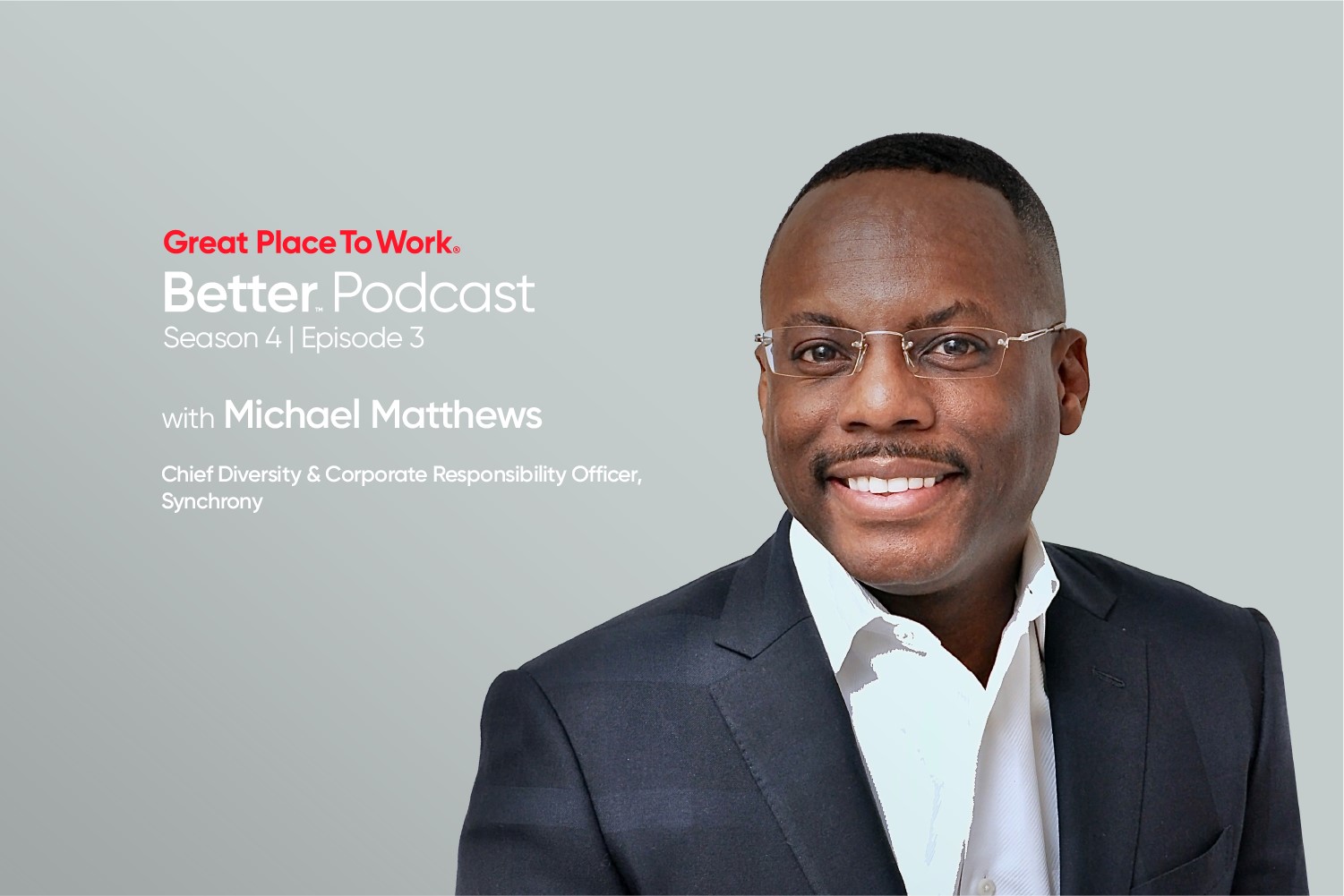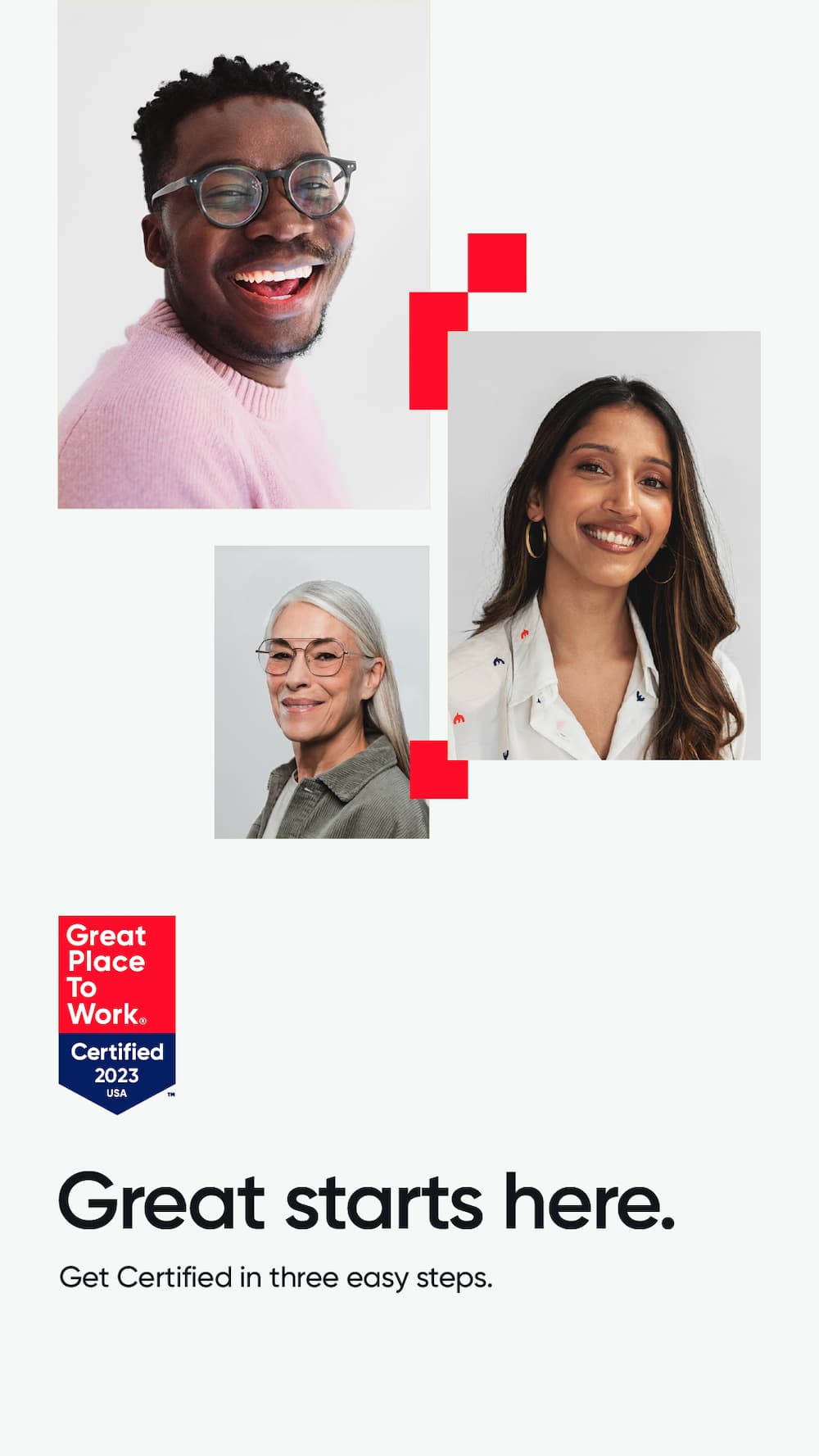Benchmarks & Trends, Best Workplaces, High-trust leadership, Leadership & Management
On this episode of the Better podcast, we hear Tim Richmond, EVP, Chief Human Resources Officer at AbbVie, and Michael C. Bush, CEO of Great Place To Work®, talk about blind spots many leaders have around culture and engaging employees.
They talk about a new way of leading where leaders feel accountable for every manager down to the front-line supervisor, why listening is the most important leadership behavior, and how they create a sense of well-being for themselves as leaders.
On why leaders don’t prioritize culture
Michael: This willingness to do something uncomfortable takes courage and change. Leaders are big on change in other people and companies, but not big on changing themselves. Culture work is hard. If you want to choose the easiest path, this isn't it.
You’ve got to have a lot of great leaders who are all out of the box being uncomfortable, learning, testing, knowing that humility that comes before curiosity. And then you get some of the best people in the world wanting to work in your company, which is what's needed to tackle more productivity, more performance, higher rate of innovation and decreasing our carbon footprint.
It's more complicated now and therefore you got to have the best people, which means you have the best leaders.
Sometimes people will ask me, "What if you don't have the support at the top?" I've never seen it succeed.
On the importance of keeping leaders accountable
Tim: We use surveys to get down to any manager with five or more employees and they get direct feedback across a number of dimensions and questions. We hold leaders accountable. The best managers are celebrated and the managers who are below a certain level on engagement or inclusion get extra help from the HR team.
We actually require them to resurvey. If I can elevate those that are below the standard for whatever reason -- there's been something acute going on – to the Abbvie standard fairly quickly, I've protected that experience for those employees, and that's positive for our culture.
Michael: It's pretty easy at the top to get high leadership scores, but what's happening seven levels down? And does this CEO feel accountable for that? That they can't feel like they're a great leader unless that frontline supervisor is creating a great experience? It sounds basic, but it rarely happens.
This responsibility for the whole chain of leadership and a leader at the top judging themselves by that frontline and mid-level experience, this is the breakthrough we feel and the difference over the next five years. This is the future of work.
On the most important leadership behavior
Michael: It's listening. Number one, to listen, you have to be humble because you're about to have an experience in a conversation. You have to dump your fears and preconceived notions and be willing to have your point of view changed.
So you're starting there and then you're asking questions. You have that journalist mindset because you want to learn. And you think that whether that person's an executive VP, a director, one of the leading scientists in the world, or the person working at a reception or behind the wheel of the truck in delivery and distribution, you talk to them the same way, and you think you can learn from them just as much as you can from that senior VP.
On the role of culture in Abbvie's business success
Tim: One of my proudest moments in my career has been the creation of the culture in our company. The reflection on that? It’s not easy. There were consultants back in the beginning who wanted to work with us, but told us to expect to not accomplish much. For reasons you might expect, we said, "Well, we're not going to work with them." We want to have aspirations, and we want to do the hard work. And it is hard work, and it has to be a priority.
The benefit that we had was that our chairman and CEO, Rick Gonzalez, who's still our chairman and CEO today, prioritized culture. And not all new CEOs do that. To have culture one of your top four business strategies is really powerful.
On self care
Tim: I My advice is to make your health and wellness a priority. You cannot be a good member of a family or your best self as it relates to being a member of a family or a community at work if you're not well.
Michael: I do know when my meditation game is on, I do a little better on the exercise game. I'm a road warrior, so I pack the shoes and go work out at 2 a.m. sometimes due to time zones. But boy, do you get rewarded for doing that.
Listen to all episodes
Subscribe to Better wherever podcasts are available so you don't miss an episode of season three.
Roula:
Welcome, Tim and Michael. This is our first episode with two guests, one of whom is my CEO. So there's absolutely no pressure whatsoever for this to be the best 30 minutes of his day. Tim, you're my neighbor up in North Chicago. I'm in the city.
Tim:
Ah, very nice to have that connection. Like most people this time of year, we're ready for spring.
Roula:
We are. We are, for sure. We do have something else in common. You and I we're both journalism majors.
Tim:
See, I knew you and I were going to get along great. I know you've got your CEO on this podcast with us, but the fact that you and I have that connection, I'm sure we're going to have a great podcast.
Roula:
Do you think your journalism background, has that helped you in as an hr pro in your career?
Tim:
Absolutely. I think the idea of communicating well so that the intended message is received by those you hope to influence or inspire or educate on any particular matter is quite helpful. And it's true around writing, it's true around your presenting or interpersonal skills. There's a whole well-roundedness that comes from that. It's interesting, we had this discussion today with my kids. They're getting ready for college and the idea of what to study and you're like, it's not that I'm going to try and influence them into this space, but it's an example of a degree, a profession that gives you skills that you use for the rest of your life. So that part I absolutely agree with.
Roula:
Yeah, I always try and push journalism, but most people don't listen. They just think, "Oh, there are no jobs." But yeah, it has many benefits. Michael, what was your major?
Michael:
Engineering. For engineering, it's problem solving. So you're attracted to problems. If they haven't been solved before, they're even more exciting. So I feel like that attraction I had to engineering, even though I'm really glad I'm not doing the math related to it now, but the idea that you can look at a tough problem that seems insolvable and find a way through it, usually with the help of others, is something I still find helps me every day.
Roula:
Tim, happy anniversary. AbbVie is celebrating its 10-year anniversary. I looked up the traditional anniversary gift for 10 years and the material is tin or aluminum because that represents durability, flexibility, which you need to sustain a healthy relationship. The workplace is no different. As we all know, it takes work to make it work and make it work well. And cultures certainly need to be flexible and adaptable to meet employee needs. So I'd love to hear the one or two lessons you've learned over the last decade when it comes to developing culture or in your role as a leader.
Tim:
From a culture perspective, it's been one of our... For me one of my proudest moments in my career has been the creation of the culture in our company. The reflection on that is, it's not easy. There were consultants back in the beginning, you can just smile as you think about this, consultants at the beginning who wanted to work with us but told us actually to expect to not accomplish very much. And so for reasons you might expect, we said, "Well, we're not going to work with them." We want to have aspirations, we want to do the hard work. And it is hard work. And it takes though a strategy, it takes hard work, commitment. And it also has to take it as a priority.
The benefit that we had was that our chairman and CEO, Rick Gonzalez, who's still our chairman and CEO today, which is a great benefit to us, prioritized culture. And not all new CEOs do that. Not all new companies do that in the same way. But to have culture one of your top four business strategies is really powerful. And so we anchored on that, we reinforced that. And so the funny story for me candidly is that he asked me to lead it and I told him I absolutely should not lead the culture initiative at AbbVie. So we had this discussion about is it really a business priority. If this gets kind of visualized as something the HR team only is working on, I don't want to lead that. I don't think we'll be successful. So part of that narrative is how much we've learned and grown together to get everyone activated, all employees, all leaders around the world, around culture at AbbVie.
Roula:
So Michael, this leads me to my next question. If we know that culture drives performance as Tim just said, if employees are having good experience, they're going to work hard for you, they're going to stay with you, they're going to recommend you, they're going to be more productive, and then you're going to be more innovative, you're going to land on 100 best lists, you're going to outperform the competition, why don't most business leaders not see it as a business imperative? Why is the AbbVie story more the exception than the rule?
Michael:
When I die, I will have that question. Absolutely that'll be my last thought I think will be, "Why? How come?" Okay, you know? Because see, listening to Tim and also with a leader like Richard and also consulting firms probably saying, "Look, you got to focus on the shareholder. Don't worry about that culture thing. This is what you focus on." So a lot of the world believes that. It's natural for us. But in my experience, it's natural for about 20% of leaders. They get it. You create a great experience for your people, they're going to take care of your company and your customers. They're going to give the company everything they have. I get it. Tim gets it. Richard gets it. Other great companies that we know get it.
Then there's about 60% that I concentrate on that are wondering about it. And that's why companies like AbbVie are very important because we can point to them and it inspires them. They can see, "Okay, here's this company a little more than a decade old doing $60 billion of revenue in 2022, thriving and growing, proving you can merge and still keep a great company and a great culture. Things that the books say you cannot do." So we are able to point that look, it's actually possible. And I think that's really important for us, for young leaders who are trying to decide if they can break that old business school mold of it's profit or it's people. You cannot have both. There's structures that people are taught that that is true, and when times get tough like right now we see some tech companies kind of moving on the profit side all of a sudden.
And so I feel like they're losing their way and just hope that they'll be inspired to come back. But Roula, I love the people who get it of course. I really am excited about the curious. I hope some curious people are listening today. The group that just doesn't get it, I don't know what to say. I don't know why they can't kind of break out of a mindset and realize that we're talking about a growth mindset and that people want the same thing every executive wants, to have a great experience, one that they're proud of and that they feel like they're personally doing work that matters. Whether they're in the pharmaceutical company or biomedical company or a technology company or a manufacturing production, all these things are parts of AbbVie. They still want the same feeling.
And so if you're in the shower excited about what you're about to do, which every executive is, how come you think your people don't want the exact same thing? You think about what you like, they like these things too. But I still find it's a riddle that's unsolved for some readers. Tim, I think you were going to lean in.
Tim:
I also like what you said, Michael, around people thinking it's an either/or. And I think it's an and. It's an and. I think the idea that you have to make it clear that this is a priority for the company, for the business, it'll help drive, Roula, to your early point around driving performance. I think that people, when they see it as something that's soft or led by HR, which was my concern, which was over overcome, they see it as that. Or it's the words on the wall, but it's not reinforced. And so the other gap I see besides the aspiration is the discipline and the rigor that you have to commit to. Again, it's not the easiest path, but I think it's clear your employees will see, "Do you clearly reinforce what it is you tell us is important around culture? Do I see it?"
You'll see it in every HR program we run, how we develop our talent, how we assess our talent, how we reward our talent from actually when we're recruiting you as a talent. All of it is aligned to our culture. All of it. Every single thing. And when people see that alignment, they see a couple things. It's reinforced, so what you say matters. And what gets rewarded is me demonstrating at the best of my ability to the standard or above our culture. People start to see this really does matter. This really is how this company, in our case, AbbVie runs. And so it's really motivating for people I think to see how embedded it is and how aligned it is and how rewarded it is. And I think Michael and Roula, some of those companies, just they're misaligned or it's not reinforced. I think that's a big gap.
Roula:
But I mean people at your level, both of you, do you respond to the... This is what I just can't... Help me fill in the gap. You respond to numbers, right? So it's clear that this leads to better business. So take the 100 best this year. So revenue per employee has grown 7% year over year. The average productivity level is at a record low according to the Bureau of Labor statistics. Those are the numbers. So if you're a numbers person and you're just focused on the bottom line, let's say you don't even really care if employees are having good experience, but you care about the bottom line, wouldn't you say, "Okay, I want those numbers. So tell me what we should do."?
Michael:
If I look at it kind of in an empathetic way about that leader that I bump into that can hear everything we're talking about right now and still wants to continue to lead the way they're leading, it's just like if I went to the doctor for just a checkup appointment early today and I had to do this treadmill thing and so on and so forth. And so I get off huffing and puffing and she's like, "You need to exercise more." So she says like five things I don't want to hear. Okay, now all of them are true and I know accurate. Now what am I going to do? Am I going to go back to what I'm comfortable doing, exercising at the pitiful level that I am? Or am I going to make these changes which takes courage. And I'm going to be uncomfortable now because I have to make these adjustments. Well it's much easier to just keep doing what I'm doing.
So there there's point one, this willingness to do something uncomfortable and takes courage and change. Leaders are big on change in other people and companies, but not big on changing themselves some. And so I think there's that part. I think that also, yeah, it's going to be harder for me to adjust my eating. It's going to be harder for me to get that routine up. All that's hard. Culture work, Tim, you make it sound easy. It is hard. Okay, if you want to choose the easiest path, this isn't it,
Tim:
Right. Right.
Michael:
Because every day there's an equal and opposite reaction to some great thing you did for your people. So we were talking about this before we got on the podcast, Roula, Tim, and I, just about you're never sleeping well. But this is the life you choose because you know the power of what can happen if you can elevate and care for a lot of people who are going to care for a lot of people in a very specific way when you think of AbbVie. It's not for everyone. So we're just trying to create more minds, especially with younger leaders to work on this part of their wellness, which is this way that we lead each other. And then now once you, "Okay, now I want to try and do it," a lot of people want to try and do it, but the work is hard. At AbbVie, every benefit is measured to see is it doing what we thought and is it doing it for everyone?
And if not, we're making changes and so on. So everything you're doing, you got to have a lot of great leaders who are all out of the box being uncomfortable, learning, testing, not knowing the humility that comes before curiosity. So you have to do that. And then now you get of course some of the best people in the world wanting to work in your company, which is what's needed to tackle more productivity, more performance, higher rate of innovation and decreasing our carbon footprint. It's more complicated now and therefore you got to have the best people, which means you have the best leaders. Sometimes people will ask me often, "What if you don't have the support at the top?" I've never seen it succeed.
Tim:
No,
Michael:
This is not a bottom up thing.
Tim:
Completely agree.
Michael:
You got to have it. You got to have it from the top.
Tim:
Now, a CEO could be that one person, but even the CEO who understands this would tell you they only do it by activating their team and all these different layers. One thing that we tried to do, Michael, and I don't suggest that we have broken the code on this, but one thing we accomplished, which was great to see was really to get every employee at some level, every manager at some level to believe. And we talked about culture at AbbVie that it was partly their responsibility.
You mentioned, and it's true, we measure incessantly in this idea of feedback to the manager level so they can understand how their team is doing versus the standard. And they understand it against the standard within AbbVie and also the standard within AbbVie over time. But also very importantly against these best company benchmarks. So we know levels of trust, engagement, inclusion, whatever it might be across our dimensions. We know where we have opportunities and where we have it. We address them. That people know where they stand, where their team is, and everyone's activated, which is part of the benefit to that long-term play, that disciplined approach. You get to that point where it is just how we do business here at AbbVie.
Roula:
So let's move into talking a little bit about leadership, which we just touched on. So leadership and management are the two top in demand skills of 2023 according to LinkedIn. And we know people leaders are responsible for so much of the employee experience. Managers impact our mental health more than a therapist or a doctor and as much as our spouse or partner. That's a study from our parent company, UKG. And they found that 60% of people they surveyed across 10 countries said their job is the biggest factor in their mental health. So that's for better or worse. Tim, you put a lot of emphasis on leadership there. You hold them accountable through employee survey. So they're getting that direct feedback. Why is that so important to hold our leaders accountable?
Tim:
We've used these surveys to get down to any manager with five or more employees is getting direct feedback on those things that I mentioned across a number of dimensions and questions, internal, external, how is this team doing? We do hold leaders accountable to it. And so the best managers are celebrated and the managers who are below a certain level on engagement or are below a certain level on inclusion get extra help with the HR team, whether it's 360s, focus groups. We actually require them to resurvey. Part of what we're trying to do is you think about how you're doing at the enterprise level, but if I can elevate those that are significantly below the standard for whatever reason there's been something acute going on there, if I can elevate them even to the AbbVie standard fairly quickly, I've protected that experience for those employees. That's positive for our culture. But I've also helped reinforce the importance of accountability.
I mentioned earlier Roula, we have a talent philosophy. It has five pieces I won't bore with the details because they're unique to us and how we wanted to define it for our company. But really what that's done is created clarity. Maybe a lesson for the people who might be listening is don't miss the importance of clarity. So we talk about culture, what does culture mean for your company? Do you have clarity on what culture means? And for us, we call ours the ways we work. We have great clarity. We measure every employee every year at least once against those ways we work. So you've got feedback against each of those. But we also have a very clearly articulated talent philosophy. So for managers, they know what's important for our company. They also equally importantly know what we expect from them in this context. And so again, clarity followed up with some discipline and rigor and then some metrics in reinforcement. That's when I think you get to that point.
Roula:
Michael, you're on the road basically all of the time and talking with business leaders and you get asked for advice on how to become a better leader, what can I work on, how can I inspire my people. What do you tell them? What's the most important behavior or... Yeah, what's the most important behavior that you share with them and what do you work on yourself?
Michael:
Yeah, it's interesting because I do get asked that all the time. I usually give the answer and then they're actually hoping for a different answer when I give it. But the answer is listening. It's listening. Number one, to listen, you have to be humble because you're about to have an experience in a conversation. Or looking at data. Surveying is listening where your mind is empty. So you got to dump all those fears and preconceived notions and things like that and be willing to have your point of view changed. And it's hard to do in a driving world with a lot to do. So you're starting there and then you're asking questions. You have that journalist mindset because you want to learn. And you think that whether that person's an executive VP, a director, one of the leading scientists in the world or the person working at reception or behind the wheel of the truck in delivery and distribution, you talk to them the same way and you think you can learn from them just as much as you can from that senior VP. That's the for all notion. That's the humility, moving into curiosity.
And then you're going to have an experience. The person you're talking to is going to be like, "Wow, that person's a really good listener." What they mean is people usually don't listen to me because we normally don't listen to each other. So this is the behavior. If you're doing that well, then you know how to recognize and reward people in a way that matters. You know how to give people developmental feedback in a candid, yet compassionate way. You know how to thank them appropriately for a job well done. You know how to let them know that the company can't achieve its purpose if they don't do something in a greater way in terms of their role. But listening gives you the currency needed to learn and develop yourself.
Leaders want people to change. People change when their leaders are changing. So this is why it's the most important thing. And this is what I practice. This is my practice. I've got a thing right above my display right now with a wheel of our nine high trust behaviors, listening seating in the middle. And right next to it I have a card that says talk less, even though I'm not doing it right now. But this is it. This is the daily practice. Meditation is listening, and I start my day there because I've learned the benefits and the connections and the innovation that comes from being able to do that.
And just as something Tim mentioned, which AbbVie is on the cutting edge in terms of what we think is next in terms of the future of work, which is that cascading Tim talked about. When you think about great companies, and we know a lot about great companies, we know more about not great companies, but I won't get into that today. But in terms of what we know from world-leading companies like an AbbVie and the others that make our list and they separate themselves, is number one, listening to Tim, it's like he hasn't accomplished anything. There's a humility and a mindset and the rearview mirror is pretty much broken. Tim referenced it. I don't think he looks at it because they're going forward. They're going forward.
I read a great article today in GQ Magazine on Tim Cook. He says, "We go forward. We're looking forward. We're not looking back." That happens at some other point in life. But this cascading notion where an executive feels responsible for the frontline supervisors, the experience they create. That's the power of this cascading. It's pretty easy at the top to get high leadership scores. It's pretty easy. I won't get into it. It's pretty easy. People know how to function at that level, plus they get bubbly water, flatwater. Life is pretty good there. But what's happening seven levels down? And does this CEO feel accountable for that? That they can't feel like they're a great leader unless that frontline supervisor is creating a great experience. That's what Tim's alluding to in making this expectation clear.
Now it sounds basic, it rarely happens. And I'm including great companies. This responsibility for the whole chain of leadership and a leader at the top judging themselves by that frontline and mid-level experience, this is the breakthrough we feel and the difference over the next five years. This is the future of work. This is how you activate for all, is by executives taking responsibility for that whole chain. Not overweighting what their executive team says about them, but taking advantage for the whole chain. Exactly what Tim is talking about. You got to give them feedback, you got to give them data. And he also said, "Look, if they don't score well, we help them." We help them. We fertilize the plant before we prune. That's what he say. Now we will prune, okay? But you fertilize first. And we believe that is the future of work.
Roula:
Michael, you just mentioned meditation. You also mentioned at the top of the call, you both were talking about how hard this work is. It's not an easy path where you both sit. So Tim, we'll start with you, and that question is how do you maintain work-life balance, a balance for yourself? Deloitte had a study earlier this year that said senior leaders and HR pros, they have higher levels of depression compared with their own employees and just as high burnout levels, which makes sense because you have so much resting on your shoulders. So the question is, how do you put on your own oxygen mask?
Tim:
I've always tried to make family first. And I say that as someone who's always fully committed to his job. I think that's maybe not a surprise at some level. But the best way I can think of it is, I think of it as in two contexts. One is me personally, which I don't put first, but I'll say my family first. And I always say to my directs and our team because sometimes they'll ask, "Oh, do you think I could..." Look, family first. And you want to tell that and you want to reinforce it. So my examples would be, I haven't missed a kid's sporting event or a musical program or whatever it might be. I don't know if ever. I mean I've always prioritized that. I've never regretted it. And so I think you have to demonstrate for your family, but also for your team by where you spend your time, what's important to you.
I've always believed that maybe it's the HR profession, maybe it's because of what we do. You observe things. I observe people and organizations and I used to observe at retirement parties. I always thought there's two types of retirement parties. There's the retirement where there's a family there or there's a community there in a sense around that leader. I thought the positivity and the reflection and the warmth of that was really powerful. And I was like, "That's the kind of retirement I'd like to have someday." And then there's the others that are kind of cold and simple, there's no family and it's quite simply. That's a person who committed only to their work. And so I was kind of looking at that saying I know what I prefer. So family first is something I believed in.
The second part that I mentioned first was you have to be personally well. Michael, just to make you feel better, I was huffing and puffing on my physical on Monday of this week. But it's important you do that, right? I think your own personal health and wellness, if I'm not at my best, how can I do my role well? I'll go back and reinforce something that I said earlier, which is I feel an enormous responsibility for the culture that we have in this company. I feel an enormous responsibility for the performance of this company. But I can't do that and I can't do that well if I'm not well, whether that's physically, emotionally, spiritually, whatever it may be. So I think it has to be a priority.
I still occasionally see people who look like they might be struggling, who do what I do at other companies. My advice to everyone listening on this podcast is make your health and wellness a priority. You cannot serve others. You cannot be a good member of a family or your best self as it relates to being a member of a family or a community at work if you're not well. So I think you think you're giving all and that's to the betterment of others, I actually don't think it is. It's got to be your health is equal.
Roula:
Yeah, which is just like life, you know? If you don't take care of yourself, you can't take care of people around you. You think you're doing the right thing by putting other people before you, but yeah, I learned that the hard way myself. You're not. And they're not asking you to do that.
Tim:
Right.
Roula:
They want you to be your best self. So Michael, how would you answer the same question? How do you put on your own oxygen mask? And also how do you find the time? Because I think, Tim, to what you said, that sounds great, but a leader in your position might say, "I don't have time to go to the doctor. I don't have time to go to the kids' games. They know I love them. It's hard to find the time because I have all these responsibilities." So what would you say to that, Michael?
Michael:
First of all, I love listening to Tim. The whole experience of just listening, how he hasn't missed a sports game, that idea of his kids. I know what that's all about, except I missed a few too many, Tim. We're not going to go into confession today, but mine are 34, 32. And so as I look back, I don't think I handled that very well. So just be one of those things, but try and use that to try and do some things different today. And so hopefully, I'll do better with my grandson. How do I know that I carry this weight of perhaps where I've over rotated? It's through my meditation where I reflect on am I really the person that I want to be? And so those things come in. They don't feel good though because they don't feel good because it means I have to change.
And so I just got through really our conversation today, the idea that, "Okay, well maybe if I work on changing more, somehow I'll find a way to help that rock hard in the box CEO who doesn't want to put people first. Maybe through my change, I feel some hopeful energy today from let me do it and maybe I'll be able to find something." I do know when my meditation game is on, I do a little better on the exercise game. And yeah, I'm a road warrior, so you got to pack the shoes and this go in and work out at 2:00 AM due to time zones. But boy do you get rewarded for doing that. But I feel inspired today that if I can get out of the box and do those things, somehow I'll find a better way to help that leader who thinks it's all about shareholder returns and doesn't understand the way to maximize those returns is to take care of their people. And not some of their people, but all of their people.
Roula:
Michael, how many minutes, how long do you meditate? And do you do guided meditations or do you sit in silence?
Michael:
Yeah, so for me it's 10 minutes because I'm still crazy and out of control. But 10 minutes works. It's either through one of the apps that I have on my phone, which is the guided. Some days though I can just get up and sit and let things go. And then I do it before the shower because when I be in that shower, man, my mind takes off. I'm into it now. And it's also a period of great creativity for me. It's in the shower that I'll see this thing, and so I got to do that beforehand.
Roula:
I think that's where therapists somehow need their couches, like showers are where people have these revelations and epiphanies.
Michael:
Absolutely.
Roula:
And somehow undergo some kind of transformation in there. Well, Tim and Michael, thanks so much for the conversation. I really enjoyed it.
Michael:
Hey, Roula, I just want to say just ahead of Tim and for the listener, Tim's a very humble person. AbbVie moves through the world in a very humble way, but you can just look at our world's best list and read what we say about them. It's tough to find a better company in the world. It's really hard to do. We rank, but this is a top tier experience that AbbVie is providing through a ton of hard work and including through times that, "Do you really want to take on this hard work?" It is what they do. And so it's not talk, it's real and they aren't satisfied. So I would definitely check out what we say about AbbVie, what AbbVie says about itself and what the people say for those who are listening who don't understand. The only way you make our list is your people put you on the list. So it's a lot of rigor and a lot of competition. But hats off. And I know you're not satisfied, Tim, but hats off on what you've accomplished and what you're about to accomplish.
Tim:
Thank you, Michael. It's always great. First of all, fantastic to join you here today. Thank you for letting me join you. Roula, thank you for guiding us through a nice discussion today and helping us reflect upon our own journeys, whether it's individually or as companies. But I do think it's important, Michael, to think about again, what does a great company look like? You help set the bar. You help set the standard. Having a partner like us, that helps us be better. So it helps us see ourselves.
You can always be guilty somewhat of your own myopathy of what you see internally. I love having great partners like you who help us see and set the bar. Just know we're committed to that. I always think my hope and dream as well is that someone will look back someday a hundred years from now at AbbVie and say, "Those people at the beginning had a vision, had an idea in mind about what they were trying to create, and that they had this belief that the work mattered around culture, it mattered around reputation, it mattered truly to be a great place to work." And so thank you for helping us create that and sustain that going forward. I really appreciate it.
Michael:
You're very welcome.
Roula:
Thanks, Tim. Thanks, Michael.












